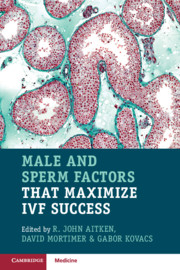Book contents
- Male and Sperm Factors that Maximize IVF Success
- Male and Sperm Factors that Maximize IVF Success
- Copyright page
- Contents
- Contributors
- Chapter 1 Sperm Selection for ART Success
- Chapter 2 New Horizons in Male Subfertility and Infertility
- Chapter 3 Chromosome Abnormalities and the Infertile Male
- Chapter 4 The Effect of Endocrine Disruptors and Environmental and Lifestyle Factors on the Sperm Epigenome
- Chapter 5 Lifestyle Factors and Sperm Quality
- Chapter 6 The Effect of Age on Male Fertility and the Health of Offspring
- Chapter 7 The Assessment and Role of Anti-sperm Antibodies
- Chapter 8 FSH Treatment in Male Infertility
- Chapter 9 Antioxidants to Improve Sperm Quality
- Chapter 10 The History of Utilization of IVF for Male Factor Subfertility
- Chapter 11 The Case Against Intracytoplasmic Sperm Injection for All
- Chapter 12 Perinatal Outcomes from IVF and ICSI
- Chapter 13 Artificial Insemination with Partner’s Sperm for Male Subfertility
- Chapter 14 Obstructive Azoospermia: Is There a Place for Microsurgical Testicular Sperm Extraction?
- Chapter 15 Should Varicocele Be Operated on Before IVF?
- Chapter 16 Donor Insemination: Past, Present and Future Perspectives
- Chapter 17 DNA Damage in Spermatozoa
- Chapter 18 Prevention of Male Infertility: From Childhood to Adulthood
- Index
- References
Chapter 6 - The Effect of Age on Male Fertility and the Health of Offspring
Published online by Cambridge University Press: 24 May 2020
- Male and Sperm Factors that Maximize IVF Success
- Male and Sperm Factors that Maximize IVF Success
- Copyright page
- Contents
- Contributors
- Chapter 1 Sperm Selection for ART Success
- Chapter 2 New Horizons in Male Subfertility and Infertility
- Chapter 3 Chromosome Abnormalities and the Infertile Male
- Chapter 4 The Effect of Endocrine Disruptors and Environmental and Lifestyle Factors on the Sperm Epigenome
- Chapter 5 Lifestyle Factors and Sperm Quality
- Chapter 6 The Effect of Age on Male Fertility and the Health of Offspring
- Chapter 7 The Assessment and Role of Anti-sperm Antibodies
- Chapter 8 FSH Treatment in Male Infertility
- Chapter 9 Antioxidants to Improve Sperm Quality
- Chapter 10 The History of Utilization of IVF for Male Factor Subfertility
- Chapter 11 The Case Against Intracytoplasmic Sperm Injection for All
- Chapter 12 Perinatal Outcomes from IVF and ICSI
- Chapter 13 Artificial Insemination with Partner’s Sperm for Male Subfertility
- Chapter 14 Obstructive Azoospermia: Is There a Place for Microsurgical Testicular Sperm Extraction?
- Chapter 15 Should Varicocele Be Operated on Before IVF?
- Chapter 16 Donor Insemination: Past, Present and Future Perspectives
- Chapter 17 DNA Damage in Spermatozoa
- Chapter 18 Prevention of Male Infertility: From Childhood to Adulthood
- Index
- References
Summary
This chapter provides detailed practical information about testing for sperm antibodies and interpretation of the results of various antibody tests. It also briefly reviews our knowledge about anti-sperm antibodies (ASA) in males and females and outlines several lines of evidence regarding the predisposing factors for sperm immunity in men and women.
Keywords
- Type
- Chapter
- Information
- Male and Sperm Factors that Maximize IVF Success , pp. 73 - 82Publisher: Cambridge University PressPrint publication year: 2020



